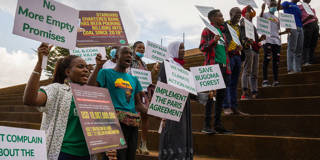As world leaders head to Glasgow for the United Nations Climate Change Conference, Africa needs decisive collective action rather than more encouraging words. In particular, rich countries should support a four-part financial and trade package that can ensure a transformative shift of resources to the region.
ABIDJAN – Almost two years into the COVID-19 pandemic, the unequal nature of the global response to the crisis is glaringly obvious. Whereas very few African countries have managed to spend the equivalent of even 1% of their GDP to combat this virtually unprecedented health emergency, Western economies have mustered over $10 trillion, or 30% of their combined GDP, to tackle it. Europe and the United States have fully vaccinated, respectively, 75% and 70% of their adult populations against COVID-19, but fewer than 6% of Africans have been vaccinated. And while some Western countries are already administering booster shots, Africa cannot get initial doses.
This systemic inequity is equally evident in efforts to address the climate crisis. Climate disasters, like viruses, know no boundaries. But whereas governments in the Global North respond to such events by borrowing on capital markets at negligible cost in order to finance stimulus and investment packages, African countries must rely on either a trickle of liquidity through debt-suspension initiatives, aid pledges, or exorbitantly expensive capital-market funding. None of these options currently provide these economies with the upfront capital investment they need to improve their long-term prospects.
As world leaders head to Glasgow for the United Nations Climate Change Conference (COP26), Africa needs decisive collective action rather than more encouraging words. We therefore propose a strategic financial and trade package that can transform climate inequality into inclusiveness by ensuring a transformative shift of resources from historic greenhouse-gas (GHG) emitters to Africa.

ABIDJAN – Almost two years into the COVID-19 pandemic, the unequal nature of the global response to the crisis is glaringly obvious. Whereas very few African countries have managed to spend the equivalent of even 1% of their GDP to combat this virtually unprecedented health emergency, Western economies have mustered over $10 trillion, or 30% of their combined GDP, to tackle it. Europe and the United States have fully vaccinated, respectively, 75% and 70% of their adult populations against COVID-19, but fewer than 6% of Africans have been vaccinated. And while some Western countries are already administering booster shots, Africa cannot get initial doses.
This systemic inequity is equally evident in efforts to address the climate crisis. Climate disasters, like viruses, know no boundaries. But whereas governments in the Global North respond to such events by borrowing on capital markets at negligible cost in order to finance stimulus and investment packages, African countries must rely on either a trickle of liquidity through debt-suspension initiatives, aid pledges, or exorbitantly expensive capital-market funding. None of these options currently provide these economies with the upfront capital investment they need to improve their long-term prospects.
As world leaders head to Glasgow for the United Nations Climate Change Conference (COP26), Africa needs decisive collective action rather than more encouraging words. We therefore propose a strategic financial and trade package that can transform climate inequality into inclusiveness by ensuring a transformative shift of resources from historic greenhouse-gas (GHG) emitters to Africa.